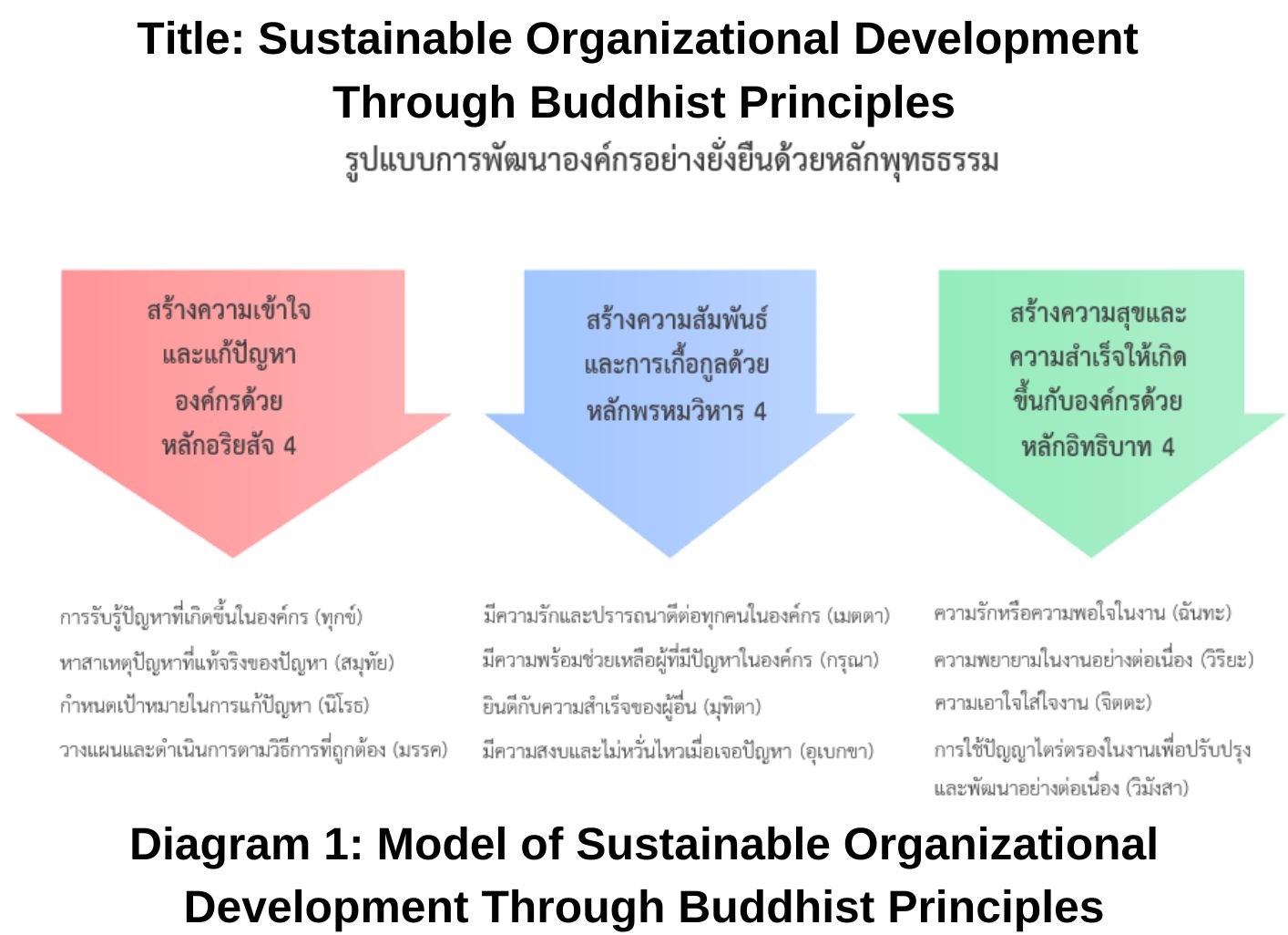Sustainable Organizational Development Through Buddhist Principles
Keywords:
Development, Organization, Sustainable, Buddhist PrinciplesAbstract
This research article is a qualitative study through document analysis, aiming to analyze sustainable organizational development using Buddhist principles. The findings reveal that sustainable organizational development through Buddhist principles can be achieved by applying Buddhist teachings at all levels of organizational management to foster sustainability and happiness in the workplace. The steps are as follows: 1) Understand and resolve organizational issues using the Four Noble Truths: recognizing problems within the organization (Dukkha), identifying the true causes of problems (Samudaya), setting goals for problem resolution (Nirodha), and planning and executing correct methods (Magga). 2) Foster relationships and mutual support using the Four Brahmaviharas: loving-kindness and goodwill towards everyone in the organization (Metta), readiness to help those facing problems in the organization (Karuna), rejoicing in others' successes (Mudita), and maintaining calm and equanimity in the face of problems (Upekkha). 3) Create happiness and success within the organization using the Four Bases of Spiritual Power: love or satisfaction in the work (Chanda), continuous effort in work (Viriya), attentiveness to the work (Citta), and using wisdom to reflect on work for continuous improvement and development (Vimamsa)
References
นิตยา พรมกันทา และคณะ. (2562). โครงการสำรวจสถานะของเป้าหมายการพัฒนาที่ยั่งยืนในบริบทประเทศไทยและทางเลือกมาตรการทางเศรษฐกิจ สังคม และกฎหมาย สำหรับเป้าหมายที่ 3 สร้างหลักประกันว่าคนมีชีวิตที่มีสุขภาพดี และส่งเสริมสวัสดิภาพสำหรับทุกคนในทุกวัย. รายงานการวิจัย. สำนักงาน คณะกรรมการส่งเสริมวิทยาศาสตร์ วิจัยและนวัตกรรม (สกสว.).
พงศ์นคร โภชากรณ์. (2567). การบูรณาการหลักพุทธธรรมเพื่อพัฒนาการบริหารจัดการโครงการลงทะเบียนเพื่อสวัสดิการแห่งรัฐ. วารสารสหวิทยาการนวัตกรรมปริทรรศน์, 7(3), 170-184.
พระพงษ์ศักดิ์ สนฺตมโน. (2563). พุทธจริยธรรมเพื่อการบริหารองค์กรในยุคไทยแลนด์ 4.0. วารสาร มจร สังคมศาสตร์ปริทรรศน์, 9(4), 284-292.
พระพรหมคุณาภรณ์ (ป.อ. ปยุตโต). (2554). พจนานุกรมพุทธศาสน์ ฉบับประมวลศัพท์. กรุงเทพฯ : สหธรรมิก.
พระมหาฉัตรชัย อภิชโย (ส่งเสริม) และ จักรี ศรีจารุเมธีญาณ. (2564). การบริหารงานตามแนวหลักพุทธธรรม. วารสารวิชาการรัตนบุศย์, 3(3), 55-65.
พิริยาภรณ์ อันทอง และศุภกร เอกชัยไพบูลย์. (2559). Checklist พิชิตธุรกิจยั่งยืน เครื่องมือการขับเคลื่อนองค์กรสู่ความยั่งยืน สําหรับธุรกิจที่เพิ่งเริ่มต้นพัฒนาความยั่งยืนในองค์กร. กรุงเทพฯ : ศูนย์พัฒนาความรับผิดชอบต่อสังคม ตลาดหลักทรัพย์แห่งประเทศไทย.
รัฐปกร รองราม. (2566). การศึกษาอิทธิพลของการพัฒนาอย่างยั่งยืนที่ส่งผลต่อการรับรู้ถึงชื่อเสียงของบริษัทมหาชน. สารนิพนธ์ปริญญาบริหารธุรกิจมหาบัณฑิต. สาขาวิชาบริหารธุรกิจ : มหาวิทยาลัยสงขลานครินทร์.
ว.วชิรเมธี. (2551). คนสำราญ งานสำเร็จ. (พิมพ์ครั้งที่ 14). กรุงเทพฯ : สำนักพิมพ์ อมรินทร์.
ศูนย์วิจัยและสนับสนุนเป้าหมายการพัฒนาที่ยั่งยืน. (2567). ข้อมูลเบื้องต้นเกี่ยวกับ SDGs. [ออนไลน์]. แหล่งที่มา : https://www.sdgmove.com/intro-to-sdgs/ [7 กรกฎาคม 2567]
สาวิตรี หวังเจริญ แลนนี่. (2565). การศึกษาปัจจัยการพัฒนาองค์กรอย่างยั่งยืน ภายหลังสถานการณ์การแพร่ระบาดของ เชื้อโคโรนาไวรัส 2019 (COVID-19) ในประเทศไทย ตามแนวคิด Sustainable Leadership กรณีศึกษา บริษัทในกล่มอุตสาหกรรมบริการด้านอสังหาริมทรัพย์. สารนิพนธ์ปริญญาการจัดการมหาบัณฑิต. วิทยาลัยการจัดการ : มหาวิทยาลัยมหิดล.
สำนักงานสภาพัฒนาการเศรษฐกิจและสังคมแห่งชาติ. (2567). รายงานความก้าวหน้าเป้าหมายการพัฒนาที่ยั่งยืนของประเทศไทย พ.ศ. 2559-2563. [ออนไลน์]. แหล่งที่มา : https://www.sdgport-th.org/2021/09/nesdc-thailands-sdg-report-2016-2020/ [7 กรกฎาคม 2567]

Downloads
Published
How to Cite
Issue
Section
License
Copyright (c) 2024 Institute of Sufficiency Journal

This work is licensed under a Creative Commons Attribution-NonCommercial-NoDerivatives 4.0 International License.



